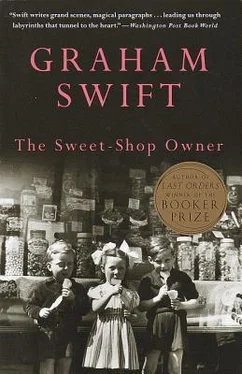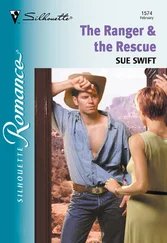Graham Swift - The Sweet-Shop Owner
Здесь есть возможность читать онлайн «Graham Swift - The Sweet-Shop Owner» весь текст электронной книги совершенно бесплатно (целиком полную версию без сокращений). В некоторых случаях можно слушать аудио, скачать через торрент в формате fb2 и присутствует краткое содержание. Год выпуска: 2012, Издательство: Vintage Books USA, Жанр: Современная проза, на английском языке. Описание произведения, (предисловие) а так же отзывы посетителей доступны на портале библиотеки ЛибКат.
- Название:The Sweet-Shop Owner
- Автор:
- Издательство:Vintage Books USA
- Жанр:
- Год:2012
- ISBN:нет данных
- Рейтинг книги:4 / 5. Голосов: 1
-
Избранное:Добавить в избранное
- Отзывы:
-
Ваша оценка:
- 80
- 1
- 2
- 3
- 4
- 5
The Sweet-Shop Owner: краткое содержание, описание и аннотация
Предлагаем к чтению аннотацию, описание, краткое содержание или предисловие (зависит от того, что написал сам автор книги «The Sweet-Shop Owner»). Если вы не нашли необходимую информацию о книге — напишите в комментариях, мы постараемся отыскать её.
The Sweet-Shop Owner — читать онлайн бесплатно полную книгу (весь текст) целиком
Ниже представлен текст книги, разбитый по страницам. Система сохранения места последней прочитанной страницы, позволяет с удобством читать онлайн бесплатно книгу «The Sweet-Shop Owner», без необходимости каждый раз заново искать на чём Вы остановились. Поставьте закладку, и сможете в любой момент перейти на страницу, на которой закончили чтение.
Интервал:
Закладка:
‘Sod him,’ said Rees. But he glanced too at the photograph and smacked his lips.
He wrote: ‘The sergeant passes by each day to make sure we are being good soldiers.’
And then her next letter came from London.
‘They finally cajoled me down here. Bombs and all. Strange, when they were so keen to pull me out in April. Father very anxious now about the business. He’s short staffed and will have to work out quotas. He behaves oddly. It’s as if the war is something I shouldn’t have to be troubled with — really his responsibility — and he apologizes to me for it. He says the country should do this and that, we must all do our bit, but it’s all a different story when it comes to the laundry.
‘I’ve had a look at Leigh Drive and the shop. They are still standing.’
He tucked each letter in his wallet behind the photograph and then when a new one arrived put the old one in an Oxo tin inside his locker. Things must be kept. On still nights you could hear the noise of anti-aircraft fire. He wrote: ‘Take care.’ But he didn’t add — perhaps that was only for the heroes, writing from the field of action — ‘I love you.’
Should they rent out the shop, he wrote (for she wouldn’t run it herself — she’d made that quite clear). Someone might take it. Perhaps Smithy knew of someone. It was only gathering dust there, wasn’t it, with its shelves cleared and its windows shuttered up? Besides there was the question of income. You got two shillings a day as a soldier. But she wrote — it was as if he’d slighted her — No, that wouldn’t be a good plan at all. So that he found himself asking — guessing how many years the war would last — How much money did she really have?
He picked up the grey-green helmets for the Quartermaster and stacked them in piles like dishes.
And yet she’d been to the shop; she wrote so. She’d been to Smithy opposite to thank him for his help and sending on the mail. So she must have gone over to look inside the shop.
Yes, though he would never learn (she had paused over her letter wondering how much to mention) how she’d stood alone by the empty counter — Father was waiting, drumming his fingers, at the office and at any moment the sirens might go — how she had run her hand over the rows of empty jars and the bare shelves and sniffed the air. It smelt of coconut.
‘3640 helmets.’
‘Back to Aylesbury, for the weekend, with Father — and it looks as though I shan’t be returning to London with him. Mother says I shouldn’t vex him. He has responsibilities and misses Jack and Paul. For the business, I wonder, or because they’ll soon be fighting for their country? Mother waits for letters from them. She prays. I have actually seen her, with her hands clasped in the bedroom. And Jack and Paul haven’t even left England. I don’t give her your news and she doesn’t ask for it. I haven’t told you, but Mother had three brothers in the army in the last war and they were all killed. I think that’s why Jack and Paul volunteered for the navy.’
*
The trucks with the canvas tops lumbered in past the guard house, wheeled round and stopped beside the gravel, and then the new conscripts got out. Some of them tried to vault over the tail-board and sometimes they fell.
He wrote: ‘I never knew about your uncles.’
‘Letter from Paul. Mother glows. He and Jack are still at Portsmouth though they leave soon for the Mediterranean. Father up for the weekend again. He says to me, “I’m proud of those boys.” I think he might have meant this as a dig at you, because he made some sort of apology afterwards. But don’t you mind him. Be a good soldier.’
The blond-haired recruit made a soft thrust at Rees, which, perhaps unintendedly, flipped his glasses into his plate. ‘You’ll need them,’ the recruit said, pointing, ‘so you can see to frig yourself in the stores.’ Rees clenched his fork and held it vertically against the table. ‘Bugger off,’ he said, ‘Willy, tell them to bugger off.’ The sergeant entered with two corporals and the men in the mess hall stood up. Rees had a splash of gravy on his cheek and was without his glasses. He was slow to find his feet. ‘Getting jealous of the new boys again, Rees?’ said the sergeant, stepping close. The blond lad smirked. ‘Don’t you laugh sonny,’ the sergeant snapped, ‘you’ll be stopping bullets soon.’
‘We are planting the vegetables for this winter. Four rows of cabbages and four of sprouts. One of the laundries has been bombed. No casualties, just machinery. Considering there are three all within five miles of the docks this was likely to have happened sooner or later. But Father’s mad. It’ll mean re-organizing and he’ll have to send some things at the shops back to customers. I don’t want to be roped in. I’m thinking of getting a job here. They want women as insurance collectors. Mother, Father and Aunt Mad disapprove, naturally, but I say to Father, “One must do one’s bit”.’
Rees, in the top bunk, leaned over to watch him fold up the notepaper. ‘Missis?’ he asked, knowing the answer, then slumped back, putting his nose to his magazine. He read endless magazines, propped on his elbow, turning the centre-page spread — ‘This Month’s Babe-in-Arms’, a girl in stockings and a tin helmet — through every angle. What did he do (he never said), this man who’d expressed one moment of awe at History and then slumped back to spend the war issuing kit and reading magazines?
And on the bunk below he read the letters, looking for signs — ‘With Love, with All my Love.’ And he wondered should he write ‘I love you’ (for perhaps in this time of war —); though he knew, if he did, it would alarm her, more than war, more than bombs and blackness.
No, she would say, that wouldn’t be a good plan.
He wrote, ‘5520 helmets,’ meaning, ‘I love you.’
Up above, the white curves in the sky had grown more complex, then dwindled. On the grass behind the barrack huts some conscripts, off duty, stripped to the waist, played football.
‘It seems as if your leave will coincide with Jack and Paul’s. They will be here briefly before they go to the Clyde. Have asthma.’
9
She sat opposite the window in the shadows of the living-room, and Mr Harrison, in the garden, peering in and holding a camera, was saying, first sternly then beseechingly, ‘Come out Irene. Come out. Don’t you want to be in it?’
She held a hand to her throat and shook her head.
*
She’d met him at the station. Her eyes had been watery and her speech quick and breathy. And there was that other look about her, of someone sent on errands they resent.
‘Won’t you come out? Don’t you want to be in it?’
Up on the lawn, where the October sun fell over the house, in front of the rockery, the michaelmas daisies and the apple trees, they were taking photographs. Figures grouped, regrouped; fussed and posed, as if it were a function or prize-giving, and they were not dressed for war, those brothers in their dark naval uniforms, but for some ‘special occasion’. Mr Harrison bore the camera like a master of ceremonies. Jack and Paul, with caps on, with caps off and held proudly over the breast, jutting their chins and giving self-conscious grins, so that the moment might be captured, manhood vindicated. This deserves a picture, this is something to be kept. And someone leafing through the pages, the school photos, the holiday snaps, would say, ‘— and there, at Aunt Mad’s in their uniforms: what fine boys.’
Click went the camera. The figures broke up, brushed lapels, recomposed. Jack alone: Paul alone. The two with Mrs Harrison, with Mr Harrison, with Aunt Mad, with Mr and Mrs Harrison together.
Читать дальшеИнтервал:
Закладка:
Похожие книги на «The Sweet-Shop Owner»
Представляем Вашему вниманию похожие книги на «The Sweet-Shop Owner» списком для выбора. Мы отобрали схожую по названию и смыслу литературу в надежде предоставить читателям больше вариантов отыскать новые, интересные, ещё непрочитанные произведения.
Обсуждение, отзывы о книге «The Sweet-Shop Owner» и просто собственные мнения читателей. Оставьте ваши комментарии, напишите, что Вы думаете о произведении, его смысле или главных героях. Укажите что конкретно понравилось, а что нет, и почему Вы так считаете.












